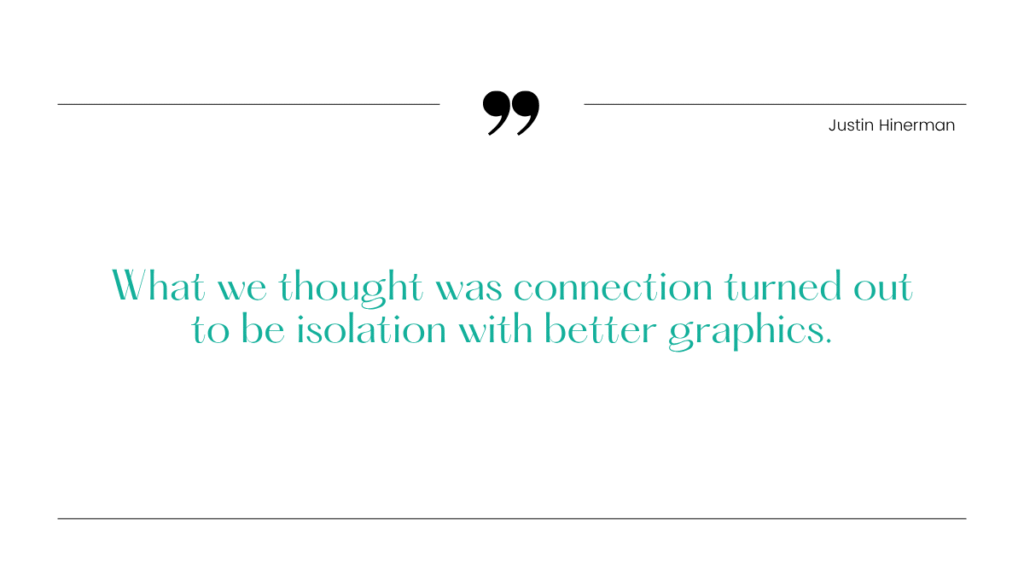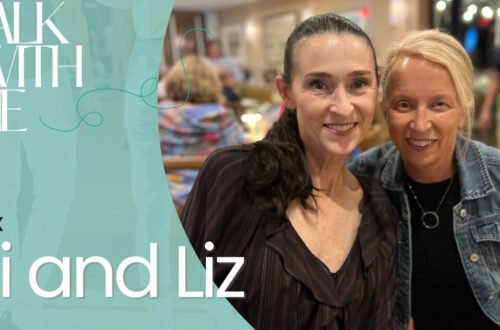If you are following along with these walks, you know I told you I want to walk with more children. I do. Many more of them… long after the 50 have been posted I would hope. It got me thinking of children I taught who now have children of their own. Case in point: Justin Hinerman. I met Justin when he was at the age of his son: 13.
I was his “computer teacher” in 8th grade, so in his world I was a rockstar.
Justin: That would have been in 1997, I think. Eighth grade. I have a memory of seeing you before I took the class. You were in the computer lab working on the computers somehow. Because anyone that was near the computers, I was locked in to. I was like, How do I get involved here?
Can I just pretend I was a rockstar for a minute? His version makes it clear that the attraction was the computer. Sigh.
Justin: My grandma had a computer, an old Tandy computer. And from the first time I saw it, I was like, this was it. I was glued to it. I had to figure out how it worked. It wasn’t just like I plugged in the disk and played a game…the big floppy floppy disk.
Somewhere along the line, I got AOL. And in fact, it was early as second I was using AOL without supervision, mind you. There’s no notion of like, “Oh, maybe this isn’t the best thing to do.” I remember even I got my account suspended once on AOL for, quote, impersonating an employee. All I did was go into a chat room and say, “Hey, just keep in mind, if you send 10 messages in five seconds, you’ll get blocked for a minute.” I learned something, and I wanted to be like, Hey, check this out.
Liz: You wanted to share it and you got blocked.
Justin: They said, “You’re impersonating an employee.” I mean, I got a letter sent to my house and everything. I couldn’t use it for a month. Those were the days when that was the worst that could happen, right?
Did we all feel that way? Every AOL commercial promised the future had arrived, delivered through almost primitive means in hindsight. It was clunky and impossibly slow, yet somehow still revolutionary. Access to this brave new world required a ritual: loading software from a CD-ROM that arrived unsolicited in your mailbox like digital evangelism, then surrendering your phone line to the shrill screech of a modem negotiating with forces beyond our understanding.
It feels absolutely foreign now, and ridiculously taxing—waiting minutes for a single photograph to materialize line by line, getting kicked off when someone needed to make a call, paying by the hour like we were renting the future itself. But none of that mattered the moment we heard those three magic words: “You’ve Got Mail.” We didn’t know we were training for a world where a dopamine hit would come from every buzz, ping, and ringtone. We just knew that something fundamental had shifted… but to what extent we had no idea.
Liz: You have a 13-year-old. I have a 17-year-old. Not that big a difference. So I feel like I should be much more aware of what she’s doing online. With all the knowledge you have, what freedom or restrictions do you have?
Justin: Well, first of all, he does not have a phone.
This is the same person who could wander around AOL at an age younger than his son. As a computer programmer AND a father, his son does not have the same free range.
Justin: That’s the biggest thing. Even though all of his friends… I mean, he’s begging. He needs a phone. Everyone in his school has a phone. Whenever it’s time to have free time in class and it’s like, Hey, the teacher says, Get out your phone, and you can look on YouTube for 10 minutes. He doesn’t have a phone, so that’s hard. I take the approach of, okay, just almost teaching by talking to him about what’s appropriate and what’s not, and then monitoring that.
Liz: When will he get a phone?
Justin: That’s the question, isn’t it? I don’t know. We thought about eighth grade – next year. He’s just left seventh grade. And then we thought about ninth grade… eighth or ninth grade, probably he’ll get a phone.
Liz: And will social media be part and parcel of that?
Justin: No. That is one thing we’ve talked to him about, is even once you do get a phone, I’m going to… Whatever Apple restrictions work, they’re going on there. I have to approve all apps. I have to… On and on and on.
Liz: Is Snapchat a social or a text?
Justin: Oh, I consider that a social.
Liz: My kids wouldn’t… that is the only way they use to communicate with friends.
Justin: Really? Snapchat? Wow.
Liz: Because I’ll say, “Text your friend…” “I snapped her.”
Justin: “I snapped her.” See, I feel like I’m falling behind.
Liz: Oh, God. If you’re going to be behind, there’s no hope for the rest of us.
Justin: It’s terrifying. I mean, you know.
We’ve gone from celebrating that first “You’ve Got Mail” to locking phones away as if it were possible to put the digital genie back in the bottle. The data is stark: rising rates of depression, anxiety, self-harm, and suicide among young people who came of age with smartphones welded to their palms. What we thought was connection turned out to be isolation with better graphics. What we celebrated as progress turned out to be rewiring developing brains in ways we’re only now beginning to understand—and regret.

Liz: So you’re in the industry? What would you do if you could have an impact on it?
Justin: Well, that’s tough. I think part of it has to be to slow down, particularly when it comes to AI, because the Silicon Valley mindset is just fast, fast, fast, iterate, break stuff, whatever, let’s try again, boom, boom, boom. And that’s fine, but sometimes you need to have some common sense of what are we exactly doing here? And at least give some time to catch up for things like regulations, sensible safeguards, things like that. Because unchecked, the tech mindset will just keep churning stuff out, and particularly with AI, just in an exponential pace of innovation.
Liz: I’m glad you explained that’s the tech mindset, and it is, and not in a negative way. We want it in all the other technological advances.
I think we can all agree we need the speeding bullet train of AI to slow down. But… it already left the station and a slow pace is antithetical to the technology mindset. Justin describes it accurately – go fast, get it wrong, iterate, try again. That is the way to get your MVP – your minimal viable product – to the market, but it is not the way we want a technology we hardly understand to impact our lives and our children’s lives. However, speed is not the only polarity – yes, I am frightened by its potential, but personally, I am already dependent on AI as a resource. As is Justin.
Justin: On the other hand, I use those tools on a daily basis to bounce ideas off of, to brainstorm, particularly working remotely. It’s not like I can just turn to someone next to me and be like, Hey, what do you think of this and that? And get a whiteboard or whatever. So oftentimes there’s this term in programming… there’s this thing called rubber ducking, where if you can explain the problem you’re trying to solve in your code to a rubber duck, typically, as you go through the explanation to the rubber duck, you’re like, I can’t figure this out. This happens. You solve the problem in your head, that’s rubber ducking.
Liz: You actually have your hand out. Is there a rubber duck?
Justin: Well, it’s like, I’m holding a pretend rubber duck.
Liz: Okay, so there’s not a rubber duck on your desk.
Justin: There’s not a real rubber duck. No.
Liz: Well, there should be.
Justin: Right. There should be a rubber duck. So to me, it’s like a modern version of rubber ducking, where you ask the thing like, This happens, or whatever, quick answers. That, to me, is…
It’s not only acceptable, but the tool is there. It’s like the calculator. Use it. But yeah, with some appropriate guardrails. But that’s the crux.
Liz: But I’m old enough that early in my Linsly career, we were discussing whether we were going to give kids demerits for having calculators. Because that was cheating. And now we don’t see it that way.
Justin: So to me, it’s a tool, but it’s a much more powerful, dangerous tool. And there’s lots of opportunities for abuse there that we need to reckon with.
Liz: So I feel like it’s 1996, ’97 all over again.
Justin: Okay.
Here we are again. Facing another brave new world, another promise that the future has arrived. This time it’s not AOL’s friendly voice saying “You’ve Got Mail”—it’s AI saying “How can I help you today?” The same breathless excitement, the same wild predictions, the same sense that everything is about to change. We’re installing apps, learning prompts, marveling at machine learning.
But we know this story now. We’ve lived through the arc from wonder to addiction to regret. We know that every technological revolution promises to solve our problems while creating new ones we never saw coming. The question isn’t whether AI will change everything—it’s whether we can hold onto both the wonder and the caution.
Liz: And you were there. You were at the beginning of it. And as you said, it was a great time to be you.
Justin: Sure.
Liz: We were basically putting the world at the fingertips of kids, so you had access to everything.
Justin: Right.
Liz: I was fighting the battles in the administration. If I can get whatever manual I need for anything online, why do I have to have manuals on a bookshelf in my office? Let’s put the curriculum online. No, then they’re not learning responsibility. They’re not learning organization. Well, they’re going to need a different level of responsibility and a different level of organization. Now, here we are again. I mean, somebody who is in eighth or ninth grade today, like your son, has the world at his fingertips in a creation way the way you did in a user way.
Justin: Very much so, yes.
Liz: But now you’re a parent afraid of it?
Justin: For sure.
Liz: Instead of a fearless teenager.
Justin: Just diving into it.
Liz: Just diving into it. Are the stakes higher?
Justin: It certainly feels that way for sure. I mean, everything’s… With your own children, it’s a whole different- Isn’t it? It’s a whole different thing. It’s remarkable. Because with your own kids, you’re just fighting this. You just want to keep them here. And yet you need to also give them the freedom and growth and all that. It’s scary.
Liz: There was a line in Finding Nemo where Dory and the dad are in the whale’s mouth. And the dad says, “I promised I’d never let anything happen to him.” And Dory, in that amazing voice, says, “Hmm. That’s a funny thing to promise.” Marlin responds, “What?”
Dory: “Well, you can’t never let anything happen to him. Then nothing would ever happen to him. Not much fun for little Harpo.” And I didn’t have kids when I was sitting in that movie theater watching that movie. I’m pretty sure I was watching with Lisa Bryson Ames. And it just hit me. That’s part of the process. And you hope, as a parent, that those failures, those challenges, aren’t life-ending or life-altering. Well, I can’t even say life-altering. You want them to alter. But in a way that still gives them the possibility of a future.
Justin: Right.
Liz: It’s hard to let go of that control.
We are not in control. Even if we think we are. Once we accept that, we stop spinning plates, chasing what-if catastrophes, and living with the twin thieves of fear and regret. We have to trust that they may just fly when they get pushed out of the nest.
Liz: The number one thing you want is communication. Period. At work, at home, everything. Because if they can talk to you, if you and your wife are talking in front of them, then you’re going to make it through all kinds of challenges. I guess you have to talk to more than a rubber duck.
Justin: Well, yeah. Machines are simpler than human beings.
I wasn’t a parent in 1997, I was a teacher. I was Justin’s teacher. I trusted him. I trusted Matt…and Erik and Steven. For me machines weren’t simpler… children were. They trusted me. In our mutual trust, I handed over control.
Liz: I like that you made the comment that you went into that chat room because you wanted to help people. And that’s the way I think of you. We used to call it “just in time” training because it was Justin training. That’s the way I think of you – you could slow down and really talk to a Luddite.
Justin: How did this even come about? Because I just… Again, I tell my kids, Oh, yeah. I worked at my high school.
Liz: I saw your strengths, Steven’s strengths, Matt’s strengths, and fill in the verb. I exploited them. I empowered you.
Justin: Well, I mean, empowered for sure… It’s almost like at the time, I didn’t appreciate it enough. It was just like, Oh, this is fun. Like I said, anything with a computer, I’m there. But also to have a feeling like, Oh, this is my thing as a middle schooler going into high school, trying to figure that out. I see that with my own kids now, right? Trying to figure out where they fit in life and with other people, to have that opportunity starting in eighth grade, ninth grade. That’s huge.
It’s funny. I remember even getting pulled, not just summer, maybe after school, whatever, but getting pulled out of one class to walk down the hallway to help another teacher. It was just like, “Let’s find Justin to fix this computer thing.”
Liz: I remember that very well. I remember one day being asked what I was doing to monitor you guys. I thought, oh, my God, they’ve passed me up. I can’t monitor them. We just have to trust them.
Trust—informed trust, earned trust, trust with guardrails—remains the antithesis to our fears…even today. Not blind faith, but something wiser: the ability to remain open to transformation while insisting on our humanity. The courage to believe that we can learn, that we can do better, that the future doesn’t have to repeat the past’s mistakes… but also to cherish the moments from the past that weren’t mistakes at all, but unexpected joys.
Liz: I think back to the video you made me for softball at the end of your senior year.
When I think back to that now, I think that is the seed that you planted in my life, that everything, anything, could be a multimedia experience. Not a lot of head of schools do videos the way we did. Not a lot of schools would even consider some of the things Country Day did early on. And I can’t find where it begins except for that year in softball.
Justin: Okay. Wow. I remember being down in that Linsly basement in that cement room.
Liz: Oh, you mean my office? Yes.
Justin: Was that your office?
Liz: Yes.
Justin: Lovely views.
But just waiting for that thing to render. Because I remember it would get like hours and hours, and then it would fail, just on and on. But yeah, I was…
Liz: And now it gets one rotation, whatever it is, and it damn well better be finished, downloaded, uploaded, whatever the case may be.
Justin: Yeah, it’s remarkable.
Liz: It is remarkable.
So what does it take to succeed in this fast-paced world of computers today?
Justin: I think to me, it all gets down to trust. And it might sound… I don’t know. But psychological safety to me is so important that it took me a long time to be able to say, “I don’t know.” Not to just be like, oh, it’s… Because not knowing something is curiosity. And that’s how you learn and grow. No one knows everything. So it took me a long time to get to that point and a long time to recognize that everyone is pretty much in the same position there. Because it’s difficult over remote… I can’t read body language. Tone doesn’t come across in your Slack, or text messages. I could put it in my head through my processor and it’d be like, Oh, this person is really pissed at me… even though they weren’t. All of this is to say the biggest thing to me is just the trust aspect.
Liz: I learned “I don’t know” in college, but I really learned “I don’t know” in practice with you because it was fine to say to you, “I don’t know how that works.” And we’d figure it out.
Justin: See, it took me years to figure that out the “I don’t know”
Liz: Well, that might be an apology that I owe you. You were my answer guy. So I didn’t make, “I don’t know,” acceptable. So I’m sorry.
Justin: Well, don’t sweat it. I think that for a long time, I felt like I had all the answers. Certainly when it came to my software and things like that, my profession, that not having the answer was so uncomfortable. And a really vulnerable place to be.
Liz: Oh, you said a lot right there. What age is it that it’s okay to be vulnerable? Have you hit it?
Justin: I hope so. I feel that way on a daily basis. I try to… When you talk about building a culture in a team at work, I try to be very upfront now. “I don’t know. I’ll have to check into that. I don’t know.” Instead of just trying to hide behind some fake answer, pretending.
Liz: Well, maybe that’s the best gift we could give our kids.
Justin: Yeah, for sure.
Twenty-seven years later, Justin sits where I once sat—the adult making choices about the intersection between technology and children. He talks to AI the way he once talked to me: bouncing ideas, solving problems, finding answers. His rubber duck has gotten smarter, but the need for trust hasn’t changed. He won’t give his thirteen-year-old the same freedom he had at thirteen, and maybe that’s wisdom, not fear.
I think about that basement office, waiting hours for a video to render, working alongside a young man who didn’t know he was teaching me to be present – that the future was already here. Now we’re both older, both saying “I don’t know” easily, both trying to figure out how vulnerability makes us authentic and relatable.
Maybe the most important lesson we learned together wasn’t about technology at all—it’s about trusting each other enough to admit we’re all just figuring it out as we go.





